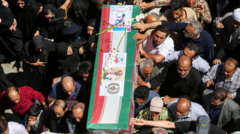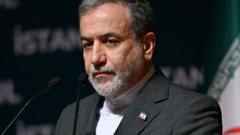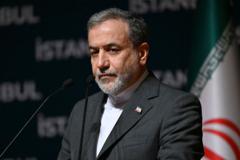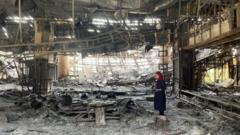Trump's willingness to consider bombing Iran reopens discussions on military strategy as tensions rise between Iran and Israel following recent strikes.
Trump Contemplates Military Action Against Iran Amid Ongoing Conflict

Trump Contemplates Military Action Against Iran Amid Ongoing Conflict
Former President's Statements Spark Debate on U.S. Foreign Policy
Former President Donald Trump declared he would "absolutely" consider military action against Iran if intelligence suggested the nation could escalate its nuclear weapons program. This bold statement came during a White House press briefing, where Trump emphasized he would "without question" order strikes should the situation necessitate it. The U.S. engaged directly in the ongoing conflict between Israel and Iran, targeting critical nuclear facilities with powerful bombs, before hastily pushing for a ceasefire.
On Thursday, Iranian Supreme Leader Ayatollah Ali Khamenei dismissed the U.S. strikes as ineffective, but Trump reiterated claims that Iran's nuclear sites were significantly damaged, saying they had been "obliterated." Iranian officials later acknowledged serious harm had been inflicted on their nuclear infrastructure.
In a post on his social media platform, Truth Social, Trump asserted he was aware of Khamenei's exact location during the conflict and had prevented military action against him. This assertion coincided with reports that the Iranian leader was in hiding as the two-week war unfolded. While both sides claimed victory, the Iranian leadership held that their nuclear ambitions remained unaffected.
The recent escalation began when Israel launched preemptive strikes on Iranian military and nuclear sites, resulting in numerous casualties, including high-profile military figures. Israeli Prime Minister Benjamin Netanyahu warned that Iran was close to being able to produce a nuclear weapon.
CBS News, a partner of the BBC, indicated that the White House was exploring potential diplomatic initiatives to bring Iran back to negotiations, including offering support for non-military nuclear projects. However, Iran has expressed no intention of resuming talks following Trump's announcement of renewed negotiations.
The airstrikes' toll was significant, with reports from Iran citing 610 casualties, while Israeli figures documented losses of 28 individuals in their territory. As the international community observes these developments, the complexities of U.S.-Iran relations continue to evolve amidst calls for peace and resolution.
On Thursday, Iranian Supreme Leader Ayatollah Ali Khamenei dismissed the U.S. strikes as ineffective, but Trump reiterated claims that Iran's nuclear sites were significantly damaged, saying they had been "obliterated." Iranian officials later acknowledged serious harm had been inflicted on their nuclear infrastructure.
In a post on his social media platform, Truth Social, Trump asserted he was aware of Khamenei's exact location during the conflict and had prevented military action against him. This assertion coincided with reports that the Iranian leader was in hiding as the two-week war unfolded. While both sides claimed victory, the Iranian leadership held that their nuclear ambitions remained unaffected.
The recent escalation began when Israel launched preemptive strikes on Iranian military and nuclear sites, resulting in numerous casualties, including high-profile military figures. Israeli Prime Minister Benjamin Netanyahu warned that Iran was close to being able to produce a nuclear weapon.
CBS News, a partner of the BBC, indicated that the White House was exploring potential diplomatic initiatives to bring Iran back to negotiations, including offering support for non-military nuclear projects. However, Iran has expressed no intention of resuming talks following Trump's announcement of renewed negotiations.
The airstrikes' toll was significant, with reports from Iran citing 610 casualties, while Israeli figures documented losses of 28 individuals in their territory. As the international community observes these developments, the complexities of U.S.-Iran relations continue to evolve amidst calls for peace and resolution.





















